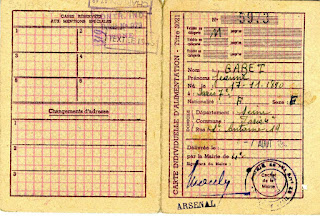Eighty years ago, the French are told (almost literally) to tighten their belts whilst the British government uses augmented wartime powers for rather less honourable purposes
The French finance
minister, Paul Reynaud, gave a radio broadcast setting out a series of economic
measures to the public. Chief amongst these was the planned introduction of
food rationing. This came some months after Britain had brought in similar
measures. With five million men mobilised for war, France’s still heavily
agrarian economy was in a poor position to meet the population’s food needs. Prices
had started to rise. The war was clearly going to last well beyond the next
harvest so the move was pre-emptive. On the demand side of the equation, the
government would subsidise the import of foreign labour and the cost of spring
sowing; the price of fertilisers would be brought down.
In ceremonies redolent of
the wars of early in the previous century, the ships’ crews of Ajax and Exeter
which had defeated the Graf Spee in the Battle of River Plate were fêted
on their return to London. They were inspected by the King, paraded through the
capital and treated to a grand formal luncheon at the Guildhall as guests of
the Lord Mayor of the City of London. The old-fashioned flavour to the
proceedings was deepened by the praise lavished on "the
brave sea captains and hardy tars who won the battle of the River Plate"
by the First Lord of the Admiralty, Winston Churchill. The utmost propaganda
value was being wrung out of Britain’s one notable achievement so far in the
war.
All of
Scotland north of the Great Glen, including the isles, was declared a “protected”
military area by the War Office. Under the Defence Regulations, this lay in its
power, a clear indication of how much civil liberties had already been
suspended. A War Office permit would be required to enter the zone. Downing Street speedily made use of another aspect of the government’s enhanced powers which
had been less openly stated and this for purposes unrelated to the war. The
phone of the leader of the opposition Liberals, Sir Archibald Sinclair, was
tapped without the need for a Home Office warrant. Because he lived in the
area covered by the defence regulations a warrant was not required. Almost needless
to say, the content of his phone calls was used for purely political purposes. Chamberlain
made a point of informing Sinclair that he was under observation.



Comments
Post a Comment